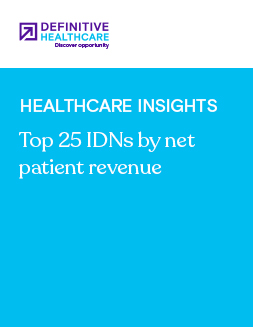Healthcare Insights
Hospitals and health systems implementing EPIC in 2024
Epic Systems Corporation provides a range of software solutions designed to help hospitals and health systems provide better patient care, improve communication, streamline workflows, and more.
Founded in 1979, Epic is one of the top vendors for inpatient and ambulatory electronic health record systems in the country. The company offers a suite of in-house developed healthcare software for a variety of tasks ranging from clinical record-keeping to registration, scheduling, billing, and more.
Although there are many proven electronic health record (EHR) systems available, Epic is the leading choice among providers. The ease with which Epic’s software integrates within a health system’s existing infrastructure and communicates with other programs—a factor known as interoperability—likely drives some of its appeal.
Using data from Definitive Healthcare’s HospitalView product, we compiled a list of the hospitals and health systems who integrated Epic into their systems in 2024.
| Rank | Health system name | 2024 implementations | Explore dataset |
|---|---|---|---|
| 1 | Albany MED Health System (FKA Albany Medical Center Health System) | 87 | Explore |
| 2 | Tidelands Health | 64 | Explore |
| 3 | McLeod Health | 7 | Explore |
| 4 | CHRISTUS Santa Rosa Health System | 3 | Explore |
| 5 | CarolinaEast Health System (AKA CarolinaEast Medical Center) | 2 | Explore |
| 6 | Memorial Health System (FKA Memorial Hospital at Gulfport Health System) | 2 | Explore |
| 7 | Shriners Hospitals for Children (AKA Shriners Childrens) | 2 | Explore |
| 8 | Southwest Health System | 1 | Explore |
Fig. 1 Data is sourced from Definitive Healthcare’s HospitalView product. Data is proprietary and updated on a continuous basis. Data accurate as of January 2025.
Which health systems implemented Epic products in 2024?
According to our HospitalView product, Epic products were integrated into 168 hospitals and health systems in 2024. Albany MED Health System ranks first with 87 implementations. This is followed by Tidelands Health in second with 64 installations and McLeod Health in third place with seven implementations.
What percentage of health systems use Epic?
Based on data from our Atlas Technology Install Dataset, Epic Systems Corporation is the leading vendor of electronic health record products. It has a U.S. market share of 37.7% making it the top EHR vendor by market share.
Oracle Cerner is close behind with a market share of 21.7%. Check out our list of top hospitals using Oracle Cerner for more details.
Learn more
Healthcare Insights are developed with healthcare commercial intelligence from the Definitive Healthcare platform. Want even more insights? Start a free trial now and get access to the latest healthcare commercial intelligence on hospitals, physicians, and other healthcare providers.


